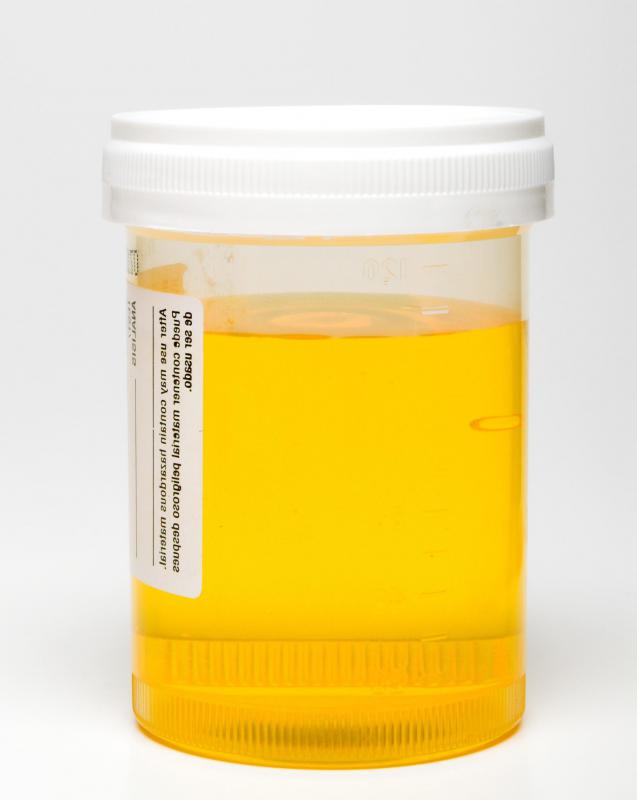At TheHealthBoard, we're committed to delivering accurate, trustworthy information. Our expert-authored content is rigorously fact-checked and sourced from credible authorities. Discover how we uphold the highest standards in providing you with reliable knowledge.
What is a Urine Glucose Test?
Medical professionals conduct various tests on patients to ensure that their bodies are functioning optimally. One such test is the urine glucose test. This procedure is used to discover the amount of glucose, or sugar, in the blood.
Formally known as a blood glucose test, the urine glucose test involves screening a patient's urine. The patient may be instructed to refrain from eating or drinking prior to the exam. Tests can also be conducted after eating or randomly, depending on the physician's instructions. He or she may also be required to cease taking certain medications temporarily.
After the patient urinates in a specimen collection jar, the sample is sent to a lab for analysis. Glucose is not naturally present within the urine. If detected in the urine, further testing will be required of the patient to determine the cause.

A urine glucose test is also known by many other names. Some of these include blood sugar test, glucosuria test, blood glucose test, fasting blood glucose test, oral glucose tolerance test, or fasting blood sugar test. The American Diabetes Association maintains that this exam should be conducted twice in order to be certain of the presence of diabetes or pre-diabetes. People with diabetes also require glucose tests to monitor their condition.

Since the invention of simple blood glucose testing, urine glucose tests are rarely ordered alone. It is often conducted within the scope of a routine urinalysis. This usually occurs during a prenatal checkup, a urinary tract screening, or a standard physical. If elevated amounts of glucose are indicated within the urine, a blood glucose test may be ordered.

If a patient exhibits signs of hyperglycemia, a glucose test may be ordered. These symptoms may include blurred vision, fatigue, increased thirst, hunger, anxiety, trembling, infections that heal slowly, confusion, sweating, and increased urination. Patients considered at-risk for diabetes, including those who are overweight or have a family history of the disease, may also require a glucose test.

Other conditions may require a urine glucose test for positive diagnosis. These may include hypoglycemia, hyperglycemia, or gestational diabetes. Elevated levels of glucose in the blood may also indicate acute stress, pancreatic cancer, acromegaly, drug use, excessive eating, pancreatitis, hyperthyroidism, or chronic renal failure. Certain medications, such as chloral hydrate and estrogen, may cause glucose to be present within the urine as well.
Emergency centers may also conduct a urine glucose test to ascertain the cause of a patient's symptoms, such as fainting or unconsciousness. Glucose tests are non-invasive procedures. These analyses do not present any risks to the patient.
AS FEATURED ON:
AS FEATURED ON:















Discussion Comments
@alisha, @anamur-- That's not exactly true. Type two diabetics may not need to use urine tests very much, but type one diabetics do and should use them to check their ketone levels. Ketones are substances that accumulate in the body when the body burns fat instead of sugar. It's a sign that there isn't enough insulin in the body.
Even though a type one diabetic's blood sugar levels may be normal, their ketone levels might be high. This is dangerous because too many ketones can lead to a coma.
Urine dipstick tests don't only test for glucose, but also test for ketones. This is something that blood glucose tests can't do. So these tests are still very important in management of diabetes.
@anamur-- I haven't used it, but as far as I know, it is not as accurate as the blood glucose test. I believe it takes a lot longer for glucose to end up in the urine, so you have to wait longer to do the test. And it won't show up unless your glucose levels are really high, like over 200mg/dl. And that's uncommon if your diabetes is under control with insulin or medications.
I think urine glucose tests are better for the initial diagnosis, not to check your blood sugar levels on a regular basis. Someone who isn't aware that they're diabetic might find out when the doctor tests for urinalysis glucose. But even that can't be confirmed without a blood glucose test.
I remember when I was little, my mom used to use the urine strips sometimes because nothing else was available. But now that blood glucose tests are available, we don't need to use urine glucose tests at home.
Has anyone here who is a diabetic used a urine glucose test before? The kind that is sold at the pharmacy and that you can do yourself at home?
I usually use a blood glucose tester to check my blood sugar. But I have run out of strips and when I went to the pharmacy to buy more, I noticed that the urine dipstick tests were cheaper. But I'm not sure about the accuracy of these test strips in comparison to the blood test strips.
Do you think I should give the urine glucose test strips a try? Or am I better off using my regular one? I don't check too often, about once a day, twice a day at most.
Post your comments